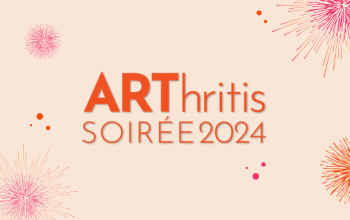The Arthritis Newsletter
Fall 2012Thank you Donors
September is Arthritis Awareness Month
Did you know that the word “arthritis” is used to describe more than 100 rheumatic diseases and conditions that affect joints, causing pain, swelling, and stiffness, often leading to disability?
Have you heard of osteoarthritis, rheumatoid arthritis, ankylosing spondylitis, psoriatic arthritis, systemic lupus erythematosus, gout, and childhood or juvenile idiopathic arthritis—all types of arthritis disease?
Were you aware that in 2007-2008, over 4.2 million Canadians (16%) aged 15 years and older were reported to have arthritis? Or that current indications are that fully 1 million additional Canadians will have arthritis in 10 years?
Did you know that it is projected that in 20 years, the prevalence of arthritis disease will likely reach I in 5 Canadians?
The costs of arthritis are immense, whether calculated in terms of individual pain, lost production, broken families, social isolation, direct and indirect medical costs, long-term disability or premature death. Arthritis is not benign and it is not just “aches and pains.” Arthritis maims and arthritis kills.
Arthritis is every Canadian’s problem and every Canadian’s burden — whatever your personal health status may currently be.
An opportune time to thank our donors!
The Consumer Advisory Board would like to take this opportunity to thank all those who have supported (and who continue to support) the Arthritis Research Centre of Canada (ARC). Our donors significantly contribute to improving the lives of those of us living with arthritis, and for this we are truly grateful. We would also like to take this opportunity to share with our readers the impact those contributors have had on arthritis research.
The Research Team
Donor dollars have made it possible for ARC to hire world-renowned scientific researchers such as: Dr. Jacek Kopec, Dr. Diane Lacaille, Dr. Jolanda Cibere, Dr. Linda Li, Dr. Antonio Avina-Zubieta, and Dr. Charlie Goldsmith. And, it is with the very welcome generosity of our donors that the Arthritis Research Centre of Canada supports the work of our researchers.
Donor contributions have recently made possible the addition of Dr. Mary De Vera to the ARC research team. Dr. De Vera holds a PhD in Health Care and Epidemiology from UBC’s School of Population and Public Health, specializing in chronic disease epidemiology, health services research, and pharmacoepidemiology. She completed a post-doctoral fellowship at the University of Montreal’s Faculty of Pharmaceutical Sciences where she studied the effects of medications taken during pregnancy on health outcomes of the mother and child. Her work was recognized with awards from Quebec’s medical research council (FRSQ), ranking first out of 84 applicants in the province. Dr. De Vera now brings this valuable new area of research to ARC … how exciting!
New Home / New Look
The Arthritis Research Centre of Canada has grown significantly over the last decade and, understandably, we have outgrown our location. Thanks to the generosity of The Milan & Maureen Ilich Foundation and Progressive Contracting Ltd. we have moved to a larger facility. The building, now named The Milan Ilich Arthritis Centre, is located in Richmond, BC. The Centre is conveniently situated near the sky train station. Our new address and phone number:
5591 No. 3 Road,
Richmond, BC V6X 2C7
Phone: 604.207.0400
With a new location comes a fresh new look. Those of you perusing the website are well aware that our logo and colours have changed. ARC’s “thumbprint” rests on exemplary, published research world wide … the new logo now reflects that fact!
Research to YOU!
ARC invests donor dollars to fund the dissemination of research findings; in other words, “to get the research findings off the shelf and out of the binders into the hands of people with arthritis, key stakeholders, and the general public.” How? By providing the community with varied knowledge dissemination options where visitors can discover scientific content, find study results relevant to their lives, learn, collaborate, and share. Key strategies include:
- Website
- Updating the content with usability as a key objective
- Presenting current and completed research projects using plain language summaries (an easy-to-read format)
- Using other mediums such as videos to educate visitors
- Newsletter
- Ensuring consumers/patients have the necessary support in order to publish a quarterly newsletter “written by consumers, for the benefit of consumers”
- Providing funds for the future translation of the newsletter to French (December 2012)
- Social Media
- Ensuring those who actively use social media platforms (Facebook and Twitter) have access to research information through those platforms
- Reaching Out with Arthritis Research (ROAR) educational forum
- Organizing an annual event where research scientists and the general public meet to discuss the latest research
Consumer / Patient Involvement
CAB members believe research that reflects the needs of arthritis patients is more likely to produce results that can be used to improve the health outcomes and the lives of those living with the disease. Donor contributions make it possible for ARC to support consumer involvement in research; consequently, the voice of the arthritis patient is well represented at ARC. CAB consumers play an essential role in representing the patient’s perspective on research studies, from inception to dissemination. For example, two CAB members were involved in Dr. Catherine Backman’s important studies examining the impact of chronic, inflammatory arthritis on parenting. A valuable outcome of her research is to share effective strategies used by parents with arthritis to overcome the everyday challenges they face.
Future Research Scientists
ARC takes an active role in helping to train the next generation of scientists. Our donors contribute to the support of the development of our future researchers – each year trainees crowd the offices and cubicles of ARC where they are able to work with and learn from leaders in the field of arthritis research. ARC provides a multi-disciplined, networked environment that easily facilitates this process.





















































